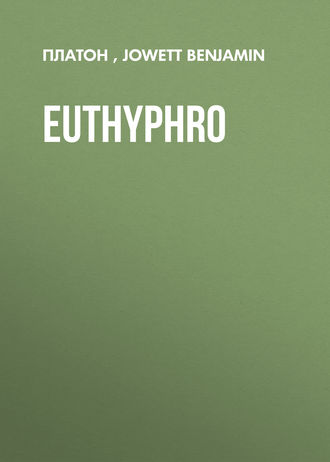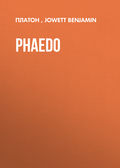
Платон
Euthyphro
SOCRATES: Well, but speaking of men, Euthyphro, did you ever hear any one arguing that a murderer or any sort of evil-doer ought to be let off?
EUTHYPHRO: I should rather say that these are the questions which they are always arguing, especially in courts of law: they commit all sorts of crimes, and there is nothing which they will not do or say in their own defence.
SOCRATES: But do they admit their guilt, Euthyphro, and yet say that they ought not to be punished?
EUTHYPHRO: No; they do not.
SOCRATES: Then there are some things which they do not venture to say and do: for they do not venture to argue that the guilty are to be unpunished, but they deny their guilt, do they not?
EUTHYPHRO: Yes.
SOCRATES: Then they do not argue that the evil-doer should not be punished, but they argue about the fact of who the evil-doer is, and what he did and when?
EUTHYPHRO: True.
SOCRATES: And the gods are in the same case, if as you assert they quarrel about just and unjust, and some of them say while others deny that injustice is done among them. For surely neither God nor man will ever venture to say that the doer of injustice is not to be punished?
EUTHYPHRO: That is true, Socrates, in the main.
SOCRATES: But they join issue about the particulars – gods and men alike; and, if they dispute at all, they dispute about some act which is called in question, and which by some is affirmed to be just, by others to be unjust. Is not that true?
EUTHYPHRO: Quite true.
SOCRATES: Well then, my dear friend Euthyphro, do tell me, for my better instruction and information, what proof have you that in the opinion of all the gods a servant who is guilty of murder, and is put in chains by the master of the dead man, and dies because he is put in chains before he who bound him can learn from the interpreters of the gods what he ought to do with him, dies unjustly; and that on behalf of such an one a son ought to proceed against his father and accuse him of murder. How would you show that all the gods absolutely agree in approving of his act? Prove to me that they do, and I will applaud your wisdom as long as I live.
EUTHYPHRO: It will be a difficult task; but I could make the matter very clear indeed to you.
SOCRATES: I understand; you mean to say that I am not so quick of apprehension as the judges: for to them you will be sure to prove that the act is unjust, and hateful to the gods.
EUTHYPHRO: Yes indeed, Socrates; at least if they will listen to me.
SOCRATES: But they will be sure to listen if they find that you are a good speaker. There was a notion that came into my mind while you were speaking; I said to myself: 'Well, and what if Euthyphro does prove to me that all the gods regarded the death of the serf as unjust, how do I know anything more of the nature of piety and impiety? for granting that this action may be hateful to the gods, still piety and impiety are not adequately defined by these distinctions, for that which is hateful to the gods has been shown to be also pleasing and dear to them.' And therefore, Euthyphro, I do not ask you to prove this; I will suppose, if you like, that all the gods condemn and abominate such an action. But I will amend the definition so far as to say that what all the gods hate is impious, and what they love pious or holy; and what some of them love and others hate is both or neither. Shall this be our definition of piety and impiety?
EUTHYPHRO: Why not, Socrates?
SOCRATES: Why not! certainly, as far as I am concerned, Euthyphro, there is no reason why not. But whether this admission will greatly assist you in the task of instructing me as you promised, is a matter for you to consider.
EUTHYPHRO: Yes, I should say that what all the gods love is pious and holy, and the opposite which they all hate, impious.
SOCRATES: Ought we to enquire into the truth of this, Euthyphro, or simply to accept the mere statement on our own authority and that of others? What do you say?
EUTHYPHRO: We should enquire; and I believe that the statement will stand the test of enquiry.
SOCRATES: We shall know better, my good friend, in a little while. The point which I should first wish to understand is whether the pious or holy is beloved by the gods because it is holy, or holy because it is beloved of the gods.
EUTHYPHRO: I do not understand your meaning, Socrates.
SOCRATES: I will endeavour to explain: we, speak of carrying and we speak of being carried, of leading and being led, seeing and being seen. You know that in all such cases there is a difference, and you know also in what the difference lies?
EUTHYPHRO: I think that I understand.
SOCRATES: And is not that which is beloved distinct from that which loves?
EUTHYPHRO: Certainly.
SOCRATES: Well; and now tell me, is that which is carried in this state of carrying because it is carried, or for some other reason?
EUTHYPHRO: No; that is the reason.
SOCRATES: And the same is true of what is led and of what is seen?
EUTHYPHRO: True.
SOCRATES: And a thing is not seen because it is visible, but conversely, visible because it is seen; nor is a thing led because it is in the state of being led, or carried because it is in the state of being carried, but the converse of this. And now I think, Euthyphro, that my meaning will be intelligible; and my meaning is, that any state of action or passion implies previous action or passion. It does not become because it is becoming, but it is in a state of becoming because it becomes; neither does it suffer because it is in a state of suffering, but it is in a state of suffering because it suffers. Do you not agree?
EUTHYPHRO: Yes.
SOCRATES: Is not that which is loved in some state either of becoming or suffering?
EUTHYPHRO: Yes.
SOCRATES: And the same holds as in the previous instances; the state of being loved follows the act of being loved, and not the act the state.
EUTHYPHRO: Certainly.
SOCRATES: And what do you say of piety, Euthyphro: is not piety, according to your definition, loved by all the gods?
EUTHYPHRO: Yes.
SOCRATES: Because it is pious or holy, or for some other reason?
EUTHYPHRO: No, that is the reason.
SOCRATES: It is loved because it is holy, not holy because it is loved?
EUTHYPHRO: Yes.
SOCRATES: And that which is dear to the gods is loved by them, and is in a state to be loved of them because it is loved of them?
EUTHYPHRO: Certainly.
SOCRATES: Then that which is dear to the gods, Euthyphro, is not holy, nor is that which is holy loved of God, as you affirm; but they are two different things.
EUTHYPHRO: How do you mean, Socrates?
SOCRATES: I mean to say that the holy has been acknowledged by us to be loved of God because it is holy, not to be holy because it is loved.
EUTHYPHRO: Yes.
SOCRATES: But that which is dear to the gods is dear to them because it is loved by them, not loved by them because it is dear to them.
EUTHYPHRO: True.
SOCRATES: But, friend Euthyphro, if that which is holy is the same with that which is dear to God, and is loved because it is holy, then that which is dear to God would have been loved as being dear to God; but if that which is dear to God is dear to him because loved by him, then that which is holy would have been holy because loved by him. But now you see that the reverse is the case, and that they are quite different from one another. For one (theophiles) is of a kind to be loved cause it is loved, and the other (osion) is loved because it is of a kind to be loved. Thus you appear to me, Euthyphro, when I ask you what is the essence of holiness, to offer an attribute only, and not the essence – the attribute of being loved by all the gods. But you still refuse to explain to me the nature of holiness. And therefore, if you please, I will ask you not to hide your treasure, but to tell me once more what holiness or piety really is, whether dear to the gods or not (for that is a matter about which we will not quarrel); and what is impiety?
EUTHYPHRO: I really do not know, Socrates, how to express what I mean. For somehow or other our arguments, on whatever ground we rest them, seem to turn round and walk away from us.
SOCRATES: Your words, Euthyphro, are like the handiwork of my ancestor Daedalus; and if I were the sayer or propounder of them, you might say that my arguments walk away and will not remain fixed where they are placed because I am a descendant of his. But now, since these notions are your own, you must find some other gibe, for they certainly, as you yourself allow, show an inclination to be on the move.
EUTHYPHRO: Nay, Socrates, I shall still say that you are the Daedalus who sets arguments in motion; not I, certainly, but you make them move or go round, for they would never have stirred, as far as I am concerned.
SOCRATES: Then I must be a greater than Daedalus: for whereas he only made his own inventions to move, I move those of other people as well. And the beauty of it is, that I would rather not. For I would give the wisdom of Daedalus, and the wealth of Tantalus, to be able to detain them and keep them fixed. But enough of this. As I perceive that you are lazy, I will myself endeavour to show you how you might instruct me in the nature of piety; and I hope that you will not grudge your labour. Tell me, then – Is not that which is pious necessarily just?







